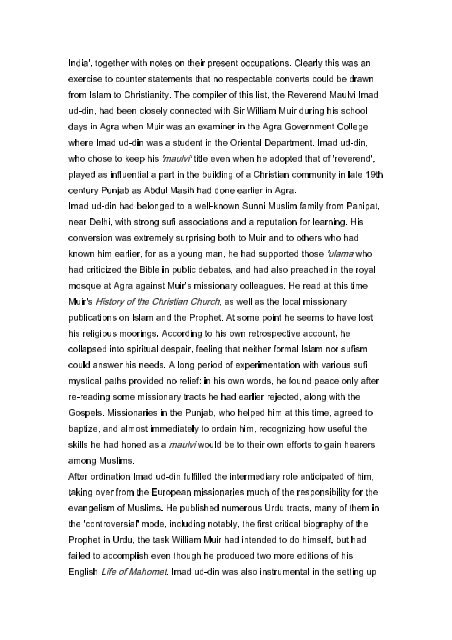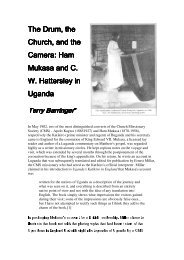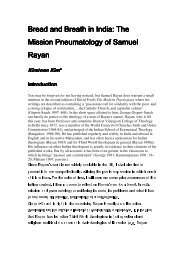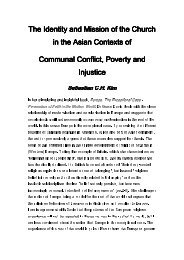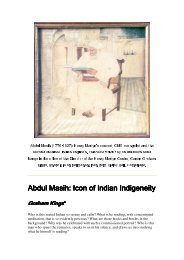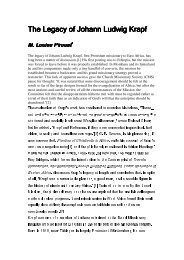the legacy of henry martyn to the study of india's muslims and islam ...
the legacy of henry martyn to the study of india's muslims and islam ...
the legacy of henry martyn to the study of india's muslims and islam ...
You also want an ePaper? Increase the reach of your titles
YUMPU automatically turns print PDFs into web optimized ePapers that Google loves.
<strong>to</strong>ge<strong>the</strong>r with notes <strong>the</strong>ir present occupations. Clearly this was an exercise counter statements that no respectable converts could be drawn from Islam Christianity. The compiler <strong>of</strong> this list, <strong>the</strong> Reverend Maulvi Imad ud-din, had been closely connected with Sir William Muir during school days Agra when Muir was an examiner in <strong>the</strong> Agra Government College India',<br />
Imad ud-din was a student <strong>the</strong> Oriental Department. Imad ud-din, who chose <strong>to</strong> keep his 'maulvi' title even when he adopted that <strong>of</strong> 'reverend', played as influential a part in <strong>the</strong> building <strong>of</strong> Christian community late 19th century Punjab as Abdul Masih had done earlier in Agra. Imad ud-din had belonged <strong>to</strong> a well-known Sunni Muslim family from Panipat, where<br />
Delhi, with strong sufi associations <strong>and</strong> a reputation for learning. His conversion was extremely surprising both <strong>to</strong> Muir <strong>and</strong> <strong>to</strong> o<strong>the</strong>rs who had known him earlier, for as a young man, he had supported those 'ulama who near<br />
criticized <strong>the</strong> Bible in public debates, <strong>and</strong> had also preached in <strong>the</strong> royal mosque Agra against Muir's missionary colleagues. He read at this time Muir's His<strong>to</strong>ry <strong>of</strong> <strong>the</strong> Christian Church, as well as <strong>the</strong> local missionary publications on Islam <strong>and</strong> <strong>the</strong> Prophet. At some point he seems <strong>to</strong> have lost his religious moorings. According <strong>to</strong> his retrospective account, he had<br />
in<strong>to</strong> spiritual despair, feeling that nei<strong>the</strong>r formal Islam nor sufism could answer his needs. A long period <strong>of</strong> experimentation with various mystical paths provided no relief: his own words, he found peace only after re-reading some missionary tracts he had earlier rejected, along with <strong>the</strong> Gospels. Missionaries in <strong>the</strong> Punjab, who helped him this time, agreed <strong>to</strong> collapsed<br />
<strong>and</strong> almost immediately <strong>to</strong> ordain him, recognizing how useful <strong>the</strong> skills he had honed as a maulvi would be <strong>to</strong> <strong>the</strong>ir own efforts <strong>to</strong> gain hearers among Muslims. baptize,<br />
ordination Imad ud-din fulfilled <strong>the</strong> intermediary role anticipated <strong>of</strong> him, taking over from European missionaries much <strong>of</strong> <strong>the</strong> responsibility for <strong>the</strong> evangelism <strong>of</strong> Muslims. He published numerous Urdu tracts, many <strong>of</strong> <strong>the</strong>m in <strong>the</strong> 'controversial' mode, including notably, <strong>the</strong> first critical biography <strong>of</strong> Prophet in Urdu, <strong>the</strong> task William Muir had intended <strong>to</strong> do himself, but had After<br />
<strong>to</strong> accomplish even though produced two more editions <strong>of</strong> his English Life <strong>of</strong> Mahomet. Imad ud-din was also instrumental in <strong>the</strong> setting up failed


